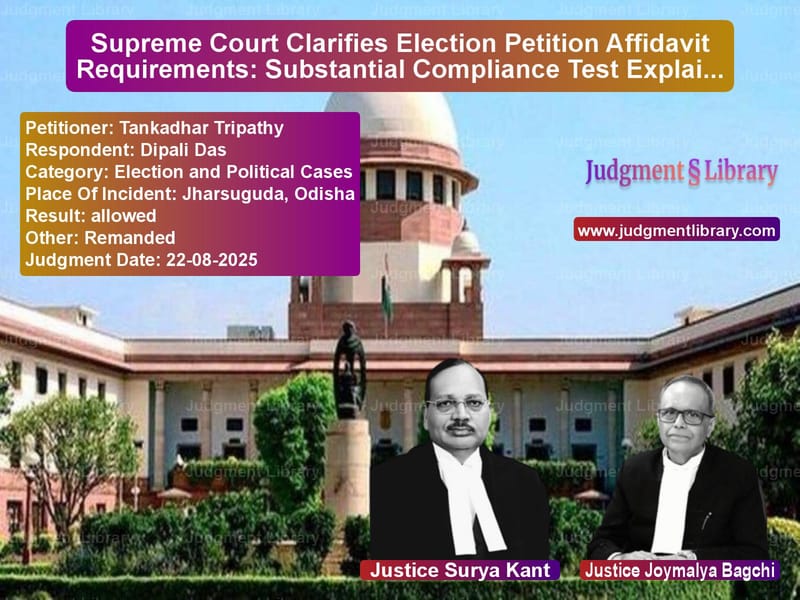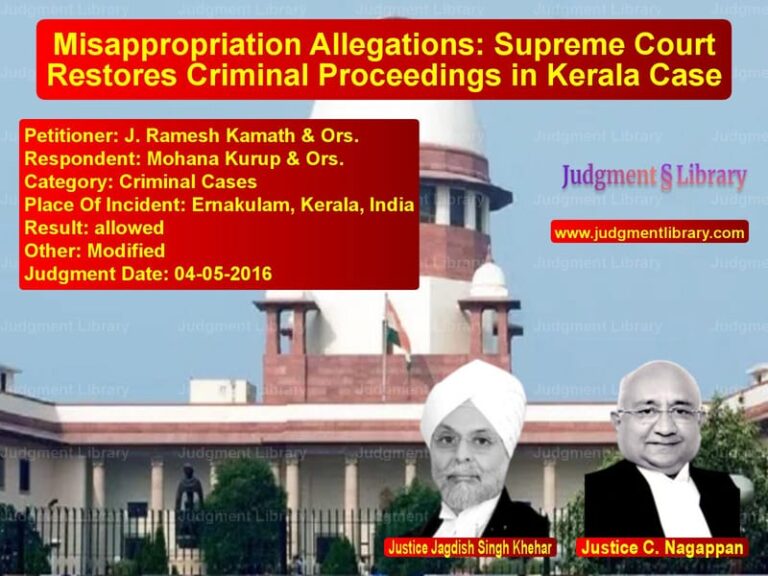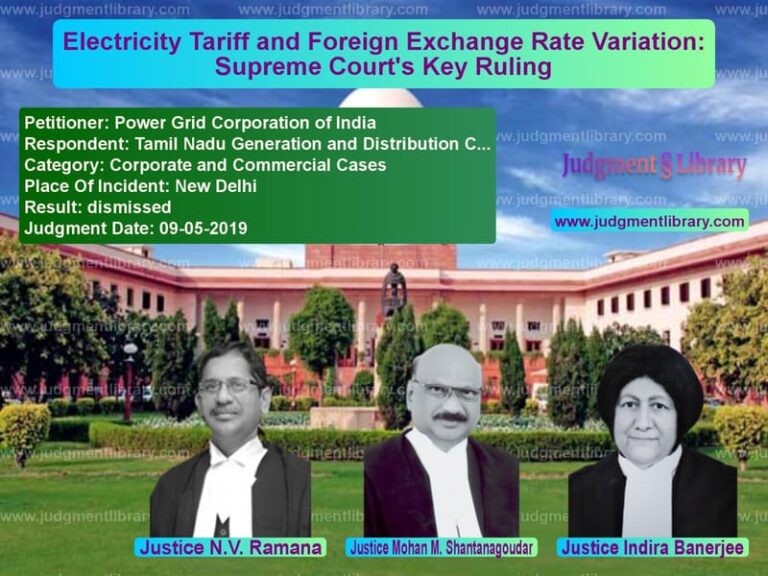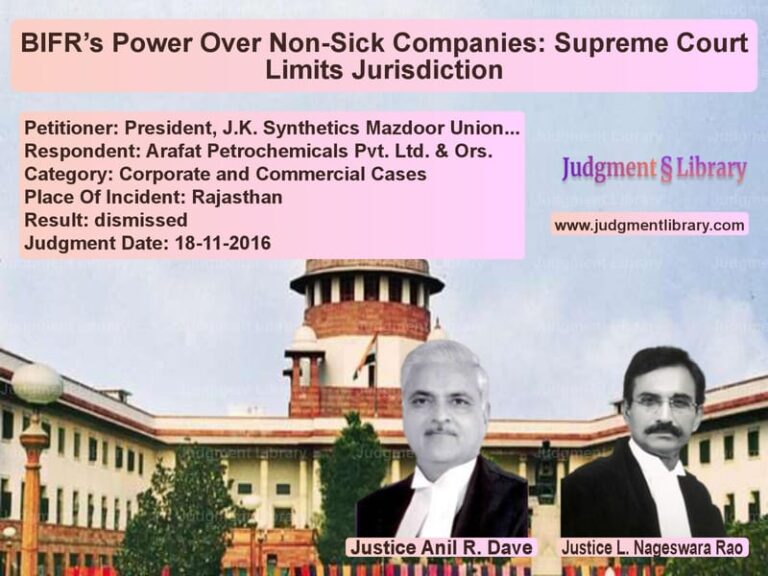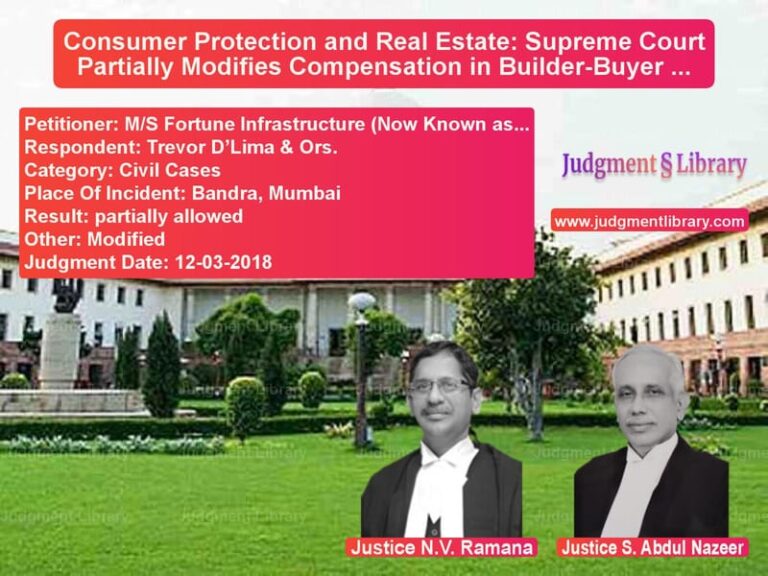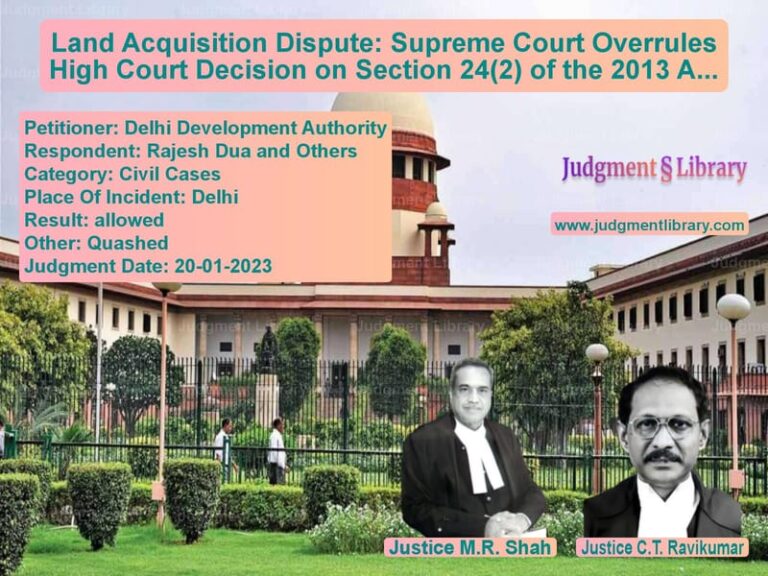Supreme Court Clarifies Election Petition Affidavit Requirements: Substantial Compliance Test Explained
In a significant ruling that clarifies the procedural requirements for challenging election results, the Supreme Court of India has delivered an important judgment on the technical aspects of election petitions. The case involved Tankadhar Tripathy, who was declared elected from the 07-Jharsuguda Assembly Constituency in Odisha, and his opponent Dipali Das, who filed an election petition challenging his victory. The legal battle centered around whether technical defects in the affidavit accompanying an election petition should lead to its immediate dismissal or whether courts should allow opportunities to rectify such deficiencies.
The dispute emerged from the 2024 Odisha Assembly elections where Tripathy was declared elected by a margin of 1,333 votes. Das filed an election petition alleging two main grounds: that Tripathy failed to make complete disclosures about his assets, liabilities, and criminal antecedents, and that there were discrepancies in Electronic Voting Machines that allegedly rendered 6,313 votes void. Tripathy countered by seeking rejection of the petition at the threshold, arguing multiple procedural defects, particularly focusing on the affidavit requirements under election law.
The Competing Legal Positions
Tripathy’s legal team, led by Senior Counsel Mr. Maninder Singh, presented several arguments for why the election petition should be rejected immediately. They contended that “the Election Petition was not accompanied by a separate affidavit in Form 25, as mandated by the proviso to Section 83(1)(c) of the RP Act. The filing of such an affidavit was mandatory when allegations of corrupt practices were made out, and the omission to do so warranted dismissal of the petition at the very threshold.”
The appellant also argued that “the allegations set out in the Election Petition were vague, unnecessary, frivolous, scandalous, and vexatious. The petition disclosed no cause of action for its maintainability under any of the grounds enumerated in Section 100 of the RP Act” and that “each page of the Election Petition was not signed and verified by the Oath Commissioner and the Respondent, as required under Section 83(1)(c) of the RP Act read with Order VI Rule 15 of the CPC.”
The Respondent’s Defense
Representing the election petitioner, Dr. Abhishekh Manu Singhvi and Mr. Gaurav Agrawal presented counter-arguments emphasizing the substantive nature of election disputes. They argued that “as per Section 86 of the RP Act, an Election Petition could be dismissed only for non-compliance with Sections 81, 82, or 171 of the RP Act. Permitting the dismissal of an Election Petition for non-compliance with Section 83 of the RP Act, a section not enumerated in Section 86, would be against the statutory mandate and legislative intent behind the RP Act.”
The respondents maintained that “any defect in the verification of the Election Petition or in the format of the affidavit filed in Form 25 would not, in itself, be fatal to the proceedings. Such defects, if any, are, as repeatedly held by this Court, curable in nature, and the High Court followed the proper course by affording the Election Petitioner an opportunity to rectify the same.”
The Legal Evolution on Affidavit Requirements
The Supreme Court traced the evolution of judicial thinking on the mandatory nature of affidavit requirements in election petitions. The Court noted that in the earlier case of Ravinder Singh v. Janmeja Singh, it was observed that “Section 83 of the RP Act was mandatory in nature, and that an Election Petition containing allegations of corrupt practices must, in law, be accompanied by an affidavit to that effect in the prescribed form.” This stricter view held that absence of a proper affidavit constituted a fatal defect warranting immediate dismissal.
However, the Court noted that this position had evolved significantly. In G. M. Siddeshwar v. Prasanna Kumar, a three-judge bench “held that while non-compliance with the provisions of Section 83 of the RP Act was curable, there must nonetheless be ‘substantial compliance’ therewith.” The Court clarified that “in cases of total and complete non-compliance with Section 83, the pleading could not be regarded as an Election Petition and was liable to be rejected at the outset.”
The Substantial Compliance Test
The Supreme Court elaborated on what constitutes ‘substantial compliance’ with affidavit requirements, noting that “this ‘evolved’ view of the law has since been relied upon and followed by this Court in more recent judgements.” The Court explained that “the requirement of filing an affidavit under the proviso to Section 83(1)(c) of the RP Act is not of a mandatory character, and that ‘substantial compliance’ therewith would suffice.”
The judgment provided crucial guidance on interpreting substantial compliance, stating that “Substantial compliance in ordinary terms means, almost, actual compliance with the essence of the enactment, or perhaps, in simpler terms, to do all that is reasonably expected, which satisfies the substance of the Statute. It, however, cannot be inferred to mean mere lip service to the requirements of the law.”
Procedural Requirements Under High Court Rules
The Court examined the specific procedural rules governing election petitions in the Orissa High Court, noting that “Rules 7 and 21 of this Chapter prescribe the process of scrutiny of an Election Petition and the procedure to be followed while conducting the proceedings.” The Court observed that “it becomes clear from a perusal of these Rules that at the stage of presenting an Election Petition, it must be examined by the prescribed officer of the High Court, alongwith its accompanying documents, so as to ensure that the same conforms with the requirements of law and the applicable rules.”
The judgment highlighted that during this scrutiny process, “if it is found that the Election Petition or its accompanying documents suffer from any defects or omissions, the same shall be placed before the learned Judge-cum-Election Tribunal.” This procedural safeguard ensures that technical defects are identified early and properly addressed.
Deficiencies in the High Court’s Order
The Supreme Court identified several deficiencies in the High Court’s approach, noting that “the Impugned Order does not clarify whether the above-stated process of scrutiny was duly followed by the prescribed officer at the time of presentation of the Election Petition.” Furthermore, “there is no reference to whether any defects were noticed at the time of admission” and “it is also indiscernible from the Impugned Order whether the Learned Judge, to whom the Election Petition was assigned, granted any time to the Election Petitioner to cure such defects at the first instance.”
The Court particularly noted that “although the High Court has concluded that the affidavit ‘substantially complied’ with the proviso to Section 83(1)(c), it has not detailed the examination conducted in order to reach such a conclusion. As a result, the necessary facts-based analysis appears to have escaped attention.”
Remand and Specific Directions
Given these procedural deficiencies, the Supreme Court decided to remand the matter back to the High Court with specific directions. The Court ordered that “the High Court is requested to identify and enumerate the defects in the Form 25 affidavit and assess whether such defects, if any, were curable.” The Court framed four specific questions for the High Court to examine as preliminary issues.
These questions included: “Whether the affidavit in the instant case, alleging ‘corrupt practices,’ is defective and does not satisfy the requirement under Form 25?” and if defective, “does it substantially satisfy the requirements of Form 25, and can it be so construed in accordance with the decisions of this Court?” The Court also directed the High Court to examine “whether the High Court-cum-Election Tribunal possesses the power to condone the delay and permit the Election Petitioner to file the affidavit, in the prescribed format of Form 25, beyond the period of limitation?”
Balancing Technical Compliance and Substantive Justice
The Supreme Court’s judgment represents a careful balancing act between ensuring procedural discipline in election petitions and preventing technicalities from overriding substantive justice. By emphasizing the ‘substantial compliance’ test rather than insisting on strict technical compliance, the Court has ensured that genuine election disputes are not thrown out on mere technical grounds.
At the same time, by remanding the matter for proper examination of whether substantial compliance was actually achieved, the Court has maintained the importance of following prescribed procedures. This approach recognizes that while technical defects should not automatically defeat election petitions, they cannot be completely ignored either.
The judgment provides crucial clarity for future election petitions, establishing that courts must conduct a factual analysis to determine whether an affidavit substantially complies with statutory requirements rather than applying rigid technical standards. This balanced approach ensures that the election dispute resolution process remains both accessible and disciplined, serving the larger goal of maintaining the integrity of electoral democracy.
Petitioner Name: Tankadhar Tripathy.Respondent Name: Dipali Das.Judgment By: Justice Surya Kant, Justice Joymalya Bagchi.Place Of Incident: Jharsuguda, Odisha.Judgment Date: 22-08-2025.Result: allowed.
Don’t miss out on the full details! Download the complete judgment in PDF format below and gain valuable insights instantly!
Download Judgment: tankadhar-tripathy-vs-dipali-das-supreme-court-of-india-judgment-dated-22-08-2025.pdf
Directly Download Judgment: Directly download this Judgment
See all petitions in Judgment by Surya Kant
See all petitions in Judgment by Joymalya Bagchi
See all petitions in allowed
See all petitions in Remanded
See all petitions in supreme court of India judgments August 2025
See all petitions in 2025 judgments
See all posts in Election and Political Cases Category
See all allowed petitions in Election and Political Cases Category
See all Dismissed petitions in Election and Political Cases Category
See all partially allowed petitions in Election and Political Cases Category

